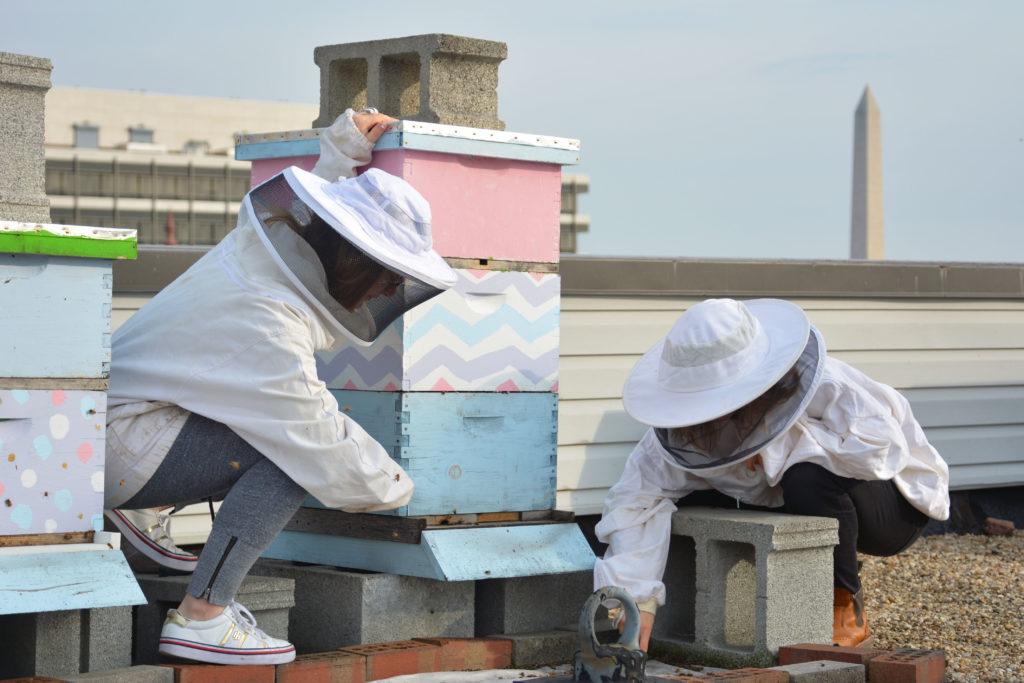Students are investigating the mysterious disappearance of bees from their hives on top of Lisner Hall – the second year in a row that at least two hives have collapsed in November.
GW Buzz’s apiary, a collection of beehives on the roof of Lisner Hall, currently houses six non-research hives, but student researchers who run the apiary said they saw the collapse of two hives last week – following two collapses last year when bees disappeared without a determined cause. Students said while the cause of the collapses is unknown, their research points to harmful pesticides used for home gardens nearby.
Kayla Schwartz, a senior and the outgoing head beekeeper for GW Buzz, said she received a Luther Rice Fellowship scholarship award in the spring and is currently working with five students. She said her research focuses on colony collapse disorder – a phenomenon that is suspected to occur after pesticides are sprayed and the majority of bees abandon a hive without any evidence of dead bees in front of or inside the hive.
Schwartz said that while two hives collapsed earlier this month, GW Buzz has one hive from 2016 that is “still thriving.”
“I’m happy with that,” she said. “They are very active, they made some pretty crazy wild comb.”
Schwartz said her research is a two-part study that started in May when her team tested two factors that scientists suspect are linked to colony collapse: varroa mites – a large parasite that preys on honeybees – and pesticide use, which bees are exposed to when they pollinate nearby plants.
She said that in addition to collecting data from the hives – three hives that were exposed to imidacloprid pesticides and three control hives – her team is recording overall behavior and is testing a bee’s ability to remember. If enough bees’ memories are compromised by exposure to pesticides, she said an entire hive could be abandoned.
Schwartz said that in 2016, she tested how a bee’s memory is affected by pesticides by first training bees to stick out their tongues – and later their stings – to the scent of lemongrass, and then comparing how they reacted to the scent after pesticide exposure, which prevented the bees from reacting to the scent.
“If they can’t remember to stick out their tongue to lemongrass, how in the hell are they going to remember how to find their way back to the hive?” she said.
Schwartz said the second part of her research – which started in September – is still ongoing and looks at how the whole hive fares during the winter without beekeeper intervention. She said that typically, she would feed bees during the winter and inspect each hive regularly, but she hasn’t completed any inspections since August. She said she plans to present her research in April 2019 at GW Research Days.
“It can open the doors to a lot of different studies of how different aspects of honey bee health might be affected in colony collapse,” she said.
Adele Queener, a junior and the incoming head beekeeper for GW Buzz, said she switched out the bottom boards of the hives on top of Lisner Hall to keep the bees more insulated and warm last Sunday and discovered two of the hives had collapsed.
Queener said that this year, hotter temperatures continued later into the summer than usual, which meant bees were out looking for food and pollinating later in the season. She said home gardeners who are usually cognizant of how the overuse of pesticides could harm honey bees might not have realized that the bees were still out and sprayed at a time when bees were still vulnerable to harmful chemicals.
Queener said honey bees are an “indicator species,” and as soon as they start disappearing, it’s a sign of long-term effects of climate change and human impacts on the environment.
“We’re going to start running out of food, and it might sound a little dramatic – like the bees are going to disappear and then we all die – but over the course of time, eventually we’ll start seeing severe effects and crops that we know and eat every day are no longer going to exist without the ability to pollinate,” she said.
Hartmut Doebel, an assistant professor of biology and the faculty adviser for GW Buzz, said research with a focus on colony collapse can bring more awareness to the public about what human and nonhuman factors influence bee health. He said that without a clear solution to the phenomenon, the United States is losing 50 to 60 percent of its bees each year.
“We are actually kicking up where we have been just a few years ago – really feeling that the overviews of pesticides has an impact on the bees, the bee behavior and their habits,” Doebel said. “We want to reconcile these two almost opposite approaches by simultaneously studying how bees are affected by pesticides and varroa mites.”
Rhea Malviya contributed reporting.





